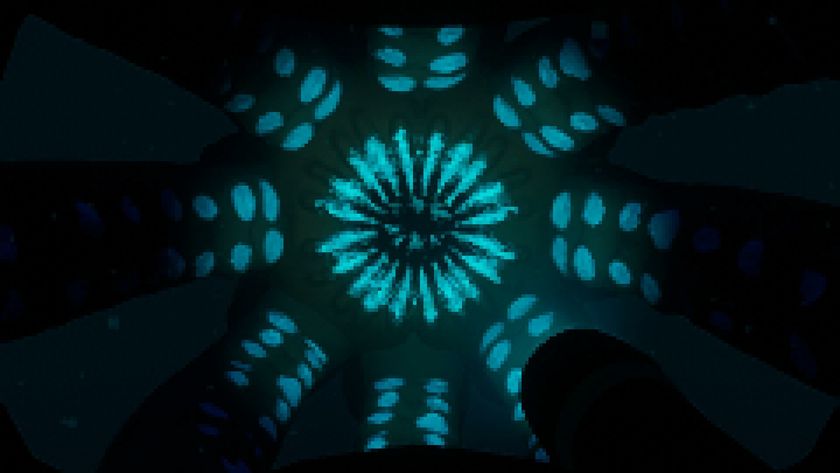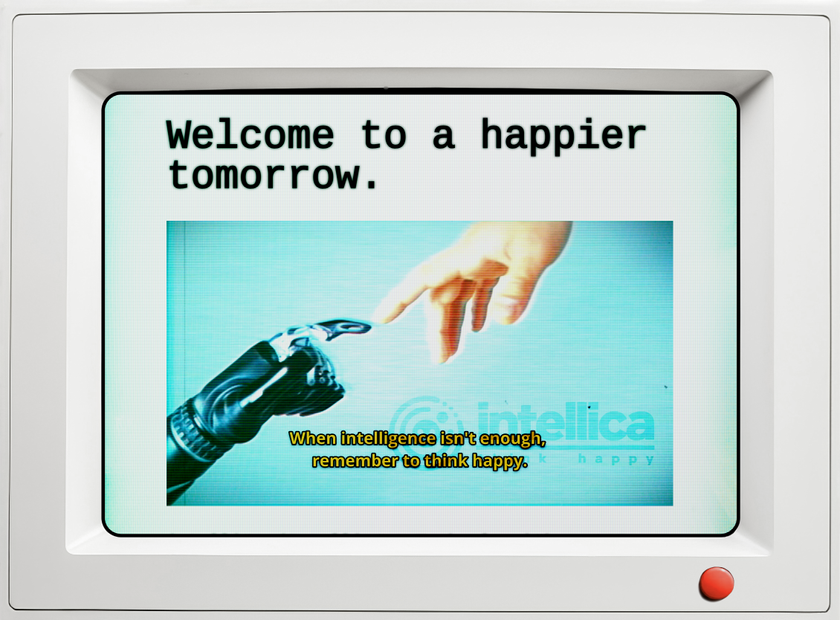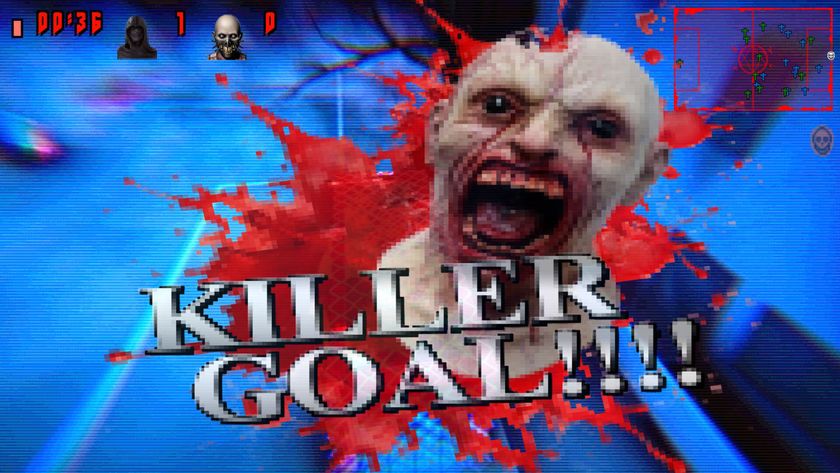There's a bone-crushing violence to The Callisto Protocol that I wasn't expecting
In space, no one can hear you say 'I wish I hadn't come to space'
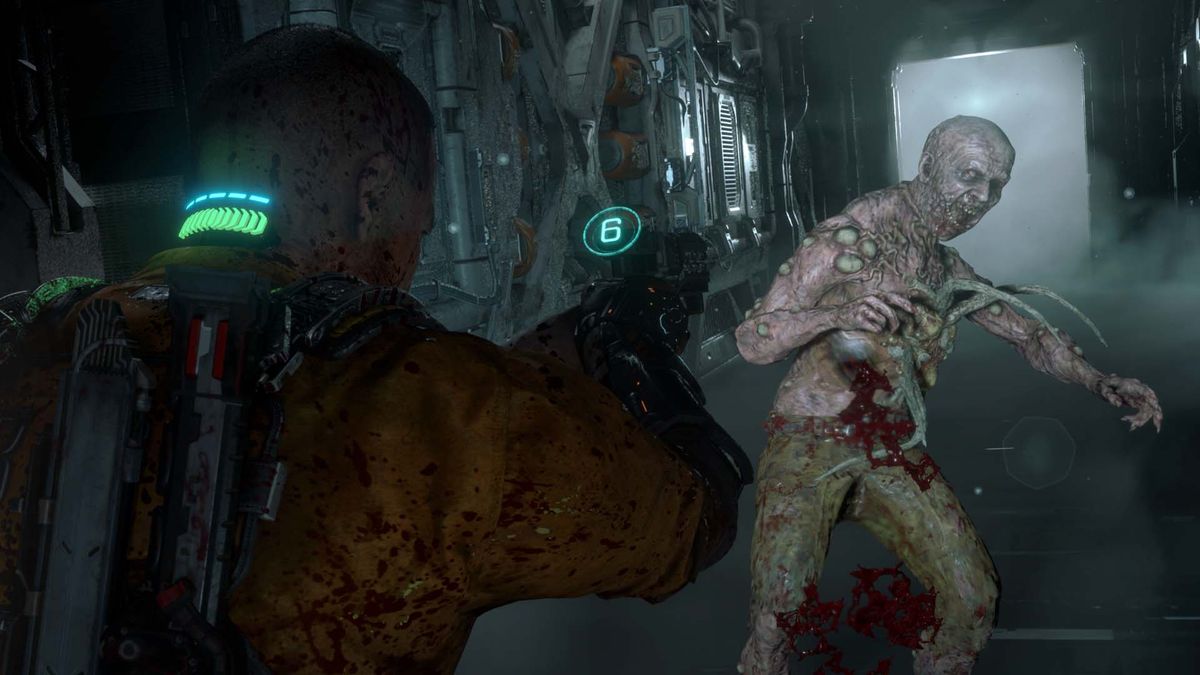
There's an absolutely bone-crushing violence to The Callisto Protocol's melee that I wasn't expecting. A weighty, crunching impact that leaps out the screen as you hack at the melty-faced monsters trying to scoop out your eyes. It's more than just extra gore, feeling like a significant power shift in a genre where melee attacks are usually the last flailing resort after your gun gives a stomach-dropping empty 'click'.
Combat here, using a knife/stun baton combo, feels potent and effective and, in turn, makes you feel far less helpless. You're still likely to die horribly at any given moment but, man, you can really smack the shit out of stuff along the way.
Fight to survive
In all honesty, it's a breath of fresh air to play a character that actually feels like they have a chance of surviving. The core of the melee revolves around the ability to dodge incoming attacks with quick taps left and right as you fight. Land enough blows and you can stagger opponents, opening up a brief 'skill shot' window where you can draw your gun for a quick, reactive high damage shot. If you can pull it all off, and maintain it under pressure, it nails a fighting dance that really makes you feel much more hero than victim.
It's a big 'if' though, as you can only really safely take on one opponent directly at a time, and you're constantly on a knife's edge in terms of landing the timings. The slightest mistake can see you limping away with a sliver of health, assuming you make it at all. In survival horror terms, however, it really places the 'survival' part more firmly in your hands. This is essentially a spiritual sequel to Dead Space, headed up by original creator Glen Schofield, who told me this brutal melee is a direct answer to that game's system. "We had people rate the [original Dead Space at the time] and then rate the melee," he says. "The game is 90, and the melee is two. And I've always thought of that, and wanted better".
It's a small thing, but this empowerment really changed the tone of the couple or so hours I played. As you'd expect from a game so inspired by Dead Space, this absolutely plays into that series' hard sci-fi space zombies wheelhouse. Again, this takes place in a very functional space environment, this time a prison on Callisto, a moon around Jupiter, that's been overrun by a strange mutating alien virus called the Biophage. The direct result is a very zombie-meets-Alien mashup, as you fight off infected prisoners and navigate a heavily industrial station clogged up with slimy, body-studded bio matter encrusted walls.
Don't touch that
Much of the story is heavily guarded at the moment, with most of my questions to Schofield deflected in the interests of not giving anything away. "I can't tell you what 'the protocol' is, because that's what the whole thing is about,'' he says, adding, "there's a deep plot, a twist in the end" to at least give me something. What we do know is that the hero, Jacob Lee, is a prisoner fighting to survive this prison full of monsters and mutations. What that involved in my time playing saw me fighting to reach a water processing plant, so that I could purge a water tank and use the pipes to reach the oxygen processing part of the station.
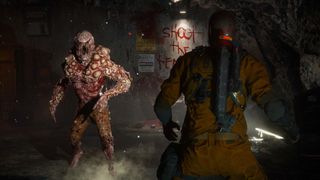
This all played out in a very action-heavy take on horror, creeping through slimey tunnels and grimy, utilitarian corridors. I mentioned hard sci-fi before and much of that comes through the heavy plating and pipes that give everything a submarine or oil rig feel. I could almost feel the oily grit of the metal surfaces. Nothing here is made to look pretty, it's made to do its job: keeping space out. Digging further into this functional aspect of hard sci-fi, I seemed to spend quite a bit of time wading through space poop. The sewage processing needs of a remote moon base apparently requires an impressive amount of easily traversable vats when you're trying to use water treatment as a shortcut. If you've ever watched The Expanse, this feels like very much at the 'Belter' end of the spectrum (and if you haven't, Belters are basically the lowest rung of humans in space, living in the filth of the machinery that makes it all possible).
Sign up to the 12DOVE Newsletter
Weekly digests, tales from the communities you love, and more
Through all of this there's still the obvious constant threat of alien zombie attack. While I focused on that melee combat to open, there are a lot of options that all feel good. I only had a pistol in the section I played but it's an absolute handcannon, with thunderous blasts rippling the air with shockwaves. Ammo treads a really nice balance between having plenty one minute and running out suddenly and without warning. You might use a few blasts to kneecap one opponent to buy time for a few direct baton blows on another, for example. I also quite often shot the legs out of an alien to then run up for a finishing blow while they were on the ground.
Get a GRP
Then there's the GRP, or 'grip', which lets you use a telekinetic power (like Dead Space's Kinesis) to grab enemies, either using them as shields or hurling them around. It's surprisingly powerful, letting you pick up an enemy straight away, no need to damage them or get them in a 'pick up able' state. On more than one occasion I just grabbed and fired a monster over a handrail into the abyss below, ending a potential fight in seconds. Combat essentially boils down to managing the threats around you, using all these tools to stay ahead and creating a tense, pressured balance between tactics and panic.
As I played, I noticed a few really interesting passing tonal changes that I loved, including a flooded-to-waist-height chamber, washed out completely in water rippled red light from the bloody biomatter growing over the walls. Or a corridor battle set against a far door's blindingly lit opening, reducing enemies to noisey blurry-edged shapes until they were almost on you. Both very simple tricks that felt more cinema than video game, but that worked beautifully as small palate cleansers against the procession of otherwise eternally grimdark corridors. There were bigger beats too, like an almost Uncharted-like water slide moment as you woosh on your back through huge water channels avoiding pipes and turbines.
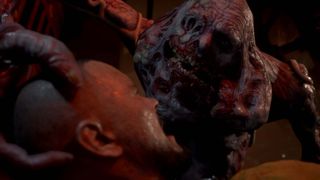
As well as these changes in tone there's what Glen called "beta paths", which are basically areas and routes away from the main progress of the game. Some of these are quite big, and, while the story is basically linear, they add an element of less predictable freedom and exploration. Sometimes you'll not realise you've taken a side path initially because there's so much going on. There's a balance as well here, between risking what resources you have against potential encounters and the promise of finding more.
From the beautiful but slab-heavy environments, to the crushing combat, I liked everything I saw in The Callisto Protocol. There's an obvious and undeniable Dead Space heart beating in its exposed ribcage – from things like monsters that burst from very familiar wall vents, or the 'cut off their tentacles' messages warning you to sever bits off creatures to stop them mutating into larger forms. But this still feels like its own thing. A more contemporary update on the ideas that feels more aware of modern tastes and tropes compared, say to the Dead Space Remake gameplay I got hands on with previously. I loved both, to be clear, but where the new Dead Space is a great reimagining of the original, The Callisto Protocol feels like a new instalment in the world of space horror.

I'm GamesRadar's Managing Editor for guides, which means I run GamesRadar's guides and tips content. I also write reviews, previews and features, largely about horror, action adventure, FPS and open world games. I previously worked on Kotaku, and the Official PlayStation Magazine and website.
Most Popular









